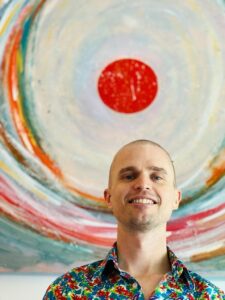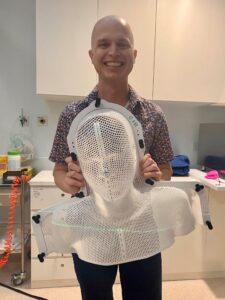Waking up one morning with bloodthe red bodily fluid that transports oxygen and other nutrients around the body in his mouth, Tristan knew something was very wrong.
He’d had no symptoms, except feeling a little congested and having a sore throat a few days prior.

“Intuitively when I saw the blood, I knew it was quite serious. It would be hard to explain this away in my head as something that wasn’t serious,” he said.
“I was living in Singapore. The first thing we did was take a taxi to the closest hospital, and then sit outside in the tropical heat in a tent as COVID precautions were still in place.
“A doctor saw me, then referred me to an ENT specialist for scoping.
“He indicated a lump could be seen visually and a biopsyremoval of a section of tissue to analyse for cancer cells via surgerytreatment involving removal of cancerous tissue and/or tumours and a margin of healthy tissue around it to reduce recurrence was booked a few days later.”
Initially diagnosed with oropharyngeal cancera disease where abnormal cells split without control and spread to other nearby body tissue and/or organs at the base of the tongue, a second opinionwhen a patient seeks another evaluation from a different doctor indicated Tristan had hyalinising clear cell carcinomacancer arising from tissues that line organs – a diagnosisthe process of identifying a disease based on signs and symptoms, patient history and medical test results confirmed in his biopsy results.
Within a fortnight of his biopsy, Tristan started his first stage of treatment, with four cycles of chemotherapya cancer treatment that uses drugs to kill or slow the growth of cancer cells, while minimising damage to healthy cells.
He then had radiation therapya treatment that uses controlled doses of radiation to damage or kill cancer cells, still in Singapore, that left him hospitalised for dehydration and malnutrition.

Once radiation was finished, Tristan returned to Australia. He had expected the tumoura tissue mass that forms from groups of unhealthy cells to be gone, but soon developed unbearable pain in his ear and head.
“It seemed the tumour had kept growing and suddenly, the pain was unbearable,” he said.
Tristan faced another three rounds of chemotherapy, then surgery, with part of his tongue removed and replaced with a graft from his leg.
Alongside the health challenges that come with a rare cancer diagnosis, Tristan faced the additional struggle of navigating not one, but two health systems as he moved between Singapore and Australia.
Unable to access public healthcare, Tristan had to pay out-of-pocket for scans and chemotherapy in Singapore’s expensive private system.
Returning to Australia brought its own hurdles.
“Re-entering the Australian system was quite difficult,” Tristan explained.
“The public system seemed hesitant to provide further chemo, so we had to seek private oncologythe study, diagnosis and treatment of cancer which was also hard to ‘break through’.
“At one point, it seemed the only solution was to go back to Singapore for treatment, which was overwhelming.”
As he got closer to returning to Australia, Tristan connected with Rare Cancers Australia.
“We accessed a Specialist Cancer Navigator in the latter part of the journey,” he said.
“Until that point, we had a clear treatment plan we thought would work (radio-chemo), but it didn’t, so we had to quickly open up all other options and research again.”

Tristan’s mantras throughout his treatment were to “stay positive” and “trust the treatment plan”, although the reality wasn’t so simple.
“For rare cancers, there is typically no ‘rule book’ or typical standard of care,” he said.
“A number of decisions had to be made on my treatment plan with inputs from medical experts, and self-research.
“Again, approaches differed between different medical communities in different countries.”
Tristan said his mindset was an important factor throughout his treatment.
“Beyond my attitude and the decisions we had to make, I couldn’t change my situation or wish for a different position,” he said.
“I found peace when accepting this.
“My commitment was to stay positive through the ups and downs. Partly for myself, but I felt for others too as I was overseas and wanted to project confidence despite the unknowns.
“We made decisions based on the best available information at the time, and sticking through it, having no doubts, was important.”
Tristan is grateful for his support crew throughout his illness, particularly facing a rare cancer where treatment options weren’t clear.
“The support of family and friends was key. It was hard being overseas for most of the treatment, so the support of family and friends who visited and a strong partner who was doing much of the research for me was invaluable,” he said.
“Also, having options. We didn’t reach the point where we exhausted ‘tried’ treatment options – it was always a question of what might work best and the sequence (unknown) for my situation.”
